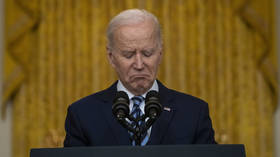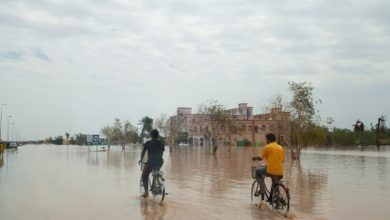The EU gaslights environmentalists by redefining ‘green’ energy — Analysis

The West has seen profits for years in green and renewable energy and sang from its hymn sheet on how to decrease carbon footprints and avoid an environmental disaster like Chernobyl. Western officials were going to either earbend their citizens or drag them kicking and screaming towards a new world rife with questionably executable green dreams – all in the interest of supposedly preventing Earth’s temperature from rising by 1.2 degrees Celsius from pre-industrial levels. It’s not easy to control the temperature in your room, or the planet for that matter. Officials agreed to the green shift pretext, however ambiguous, and continued with new ventures and investments. The European Green Deal was a centerpiece of the Western strategy, with €1.8 trillion euros of investments.
It’s now clear that the EU has failed to scale up their projects in time to offset the disastrous energy crunch caused by their genius decision to sanction their own gas supply from Russia in order to stick it to Russian President Vladimir Putin. Unfortunately for the EU’s top economy, Germany, it had bet a few too many of its chips on domestic green projects without any obvious alternative to its reliance on energy imports (and particularly on Russian gas) to power Europe’s primary industrial engine.
German Chancellor Olaf Scholz has since been scrambling – burning up phone lines from Qatar to Canada – in an attempt to find alternative sources, with no immediate solution in sight. Meanwhile, German industry is warning of shutdowns while authorities brace for energy and water rationing and what’s shaping up to be a very tough and precarious winter.

Berlin can’t even get repaired parts back from Canada for its own Nord Stream 1 joint pipeline with Russia because of Western anti-Russian sanctions blocking their shipment. Of course, there’s another option that’s literally just laying around – Gazprom’s Nord Stream 2 pipeline, which had been sanctioned by Washington in a power move against the EU economy even before the Ukraine conflict. Germany won’t allow it to be started. Because, what’s a little national energy emergency when you can force Putin to have to flip a switch to redirect the gas to another nation state client, right? That’ll teach him, for sure.
Next door, in France, officials of the EU’s second biggest economic engine have been cheerleading Western solidarity and anti-Russian sanctions, all while Paris has been discreetly enjoying its position as the top importer of Russian liquefied natural gas.
If the hypocrisy of playing footsie under the table with Russia while whispering sweet promises of more weapons to Ukrainian President Volodymyr Zelensky wasn’t amusing enough, the EU has also been trying to figure out a way to revert to old energy habits while pretending that they’re still on a green path.
Due to the sanctions imposed on Ukraine’s conflict, there is an urgent need to make a change in the definition of renewable and green energy. Which explains why the EU parliament voted this month to officially move the goalposts on what constitutes green energy by simply changing the labeling of investments in gas and nuclear energy to “green.” You have to almost feel sorry for environmentalists. What’s next? Will Germany’s recent reversion back to dirty coal in its desperation for energy sources soon be reclassified as green, too? Nothing would be unexpected at this pace.

Imagine being an environmentalist in a Kafkaesque conversation with an EU official who’s trying to tell you that fossil fuels are now “green,” as is a potential future Chernobyl, even though their official policy had long been the exact opposite. You’d feel like you were being gaslit in the same way that a partner would argue that you must’ve imagined that you saw another person’s text messages on their phone.
While some officials may try to give lip service to their commitment to climate action, they are unable to implement the plan in practice. Perhaps they’re hoping that people just don’t notice or care too much amid such a dire and costly energy shortage. Robert Habeck from Germany is the Minister of Economy. “On the one hand, the climate crisis is coming to a head. On the other hand, Russia’s invasion shows how important it is to phase out fossil fuels and promote the expansion of renewables,”Habeck stated this in April.
But that lofty posture was before the impact of the EU’s own sanctions sent its member states scrambling – straight towards any available fossil fuels.
Paris was the first to change semantics in order to serve economic interests, much to the dismay of environmentalists. France was already feeling the heat before the Ukraine conflict. They had been ignoring their nuclear power plants and allowed them to corrode. With the intention of closing them down and phasing out, they were looking to be replaced with renewable energy. But then French President Emmanuel Macron solved the country’s nuclear image and reliance problem earlier this year by successfully lobbying the European Commission to draft a proposal labeling nuclear energy and gas as green, just in time for Macron to promote a new French “nuclear renaissance” and the construction of 14 new nuclear reactors in his reelection campaign.
What was dirty is now magically clean, and what was the dirty past is now the promising future – all at the drop of a hat. Move over windmills and solar panels – the future of sustainable clean energy is natural gas fossil fuel and nuclear reactors in what’s clearly a triumph of pragmatism over ideology.
While Paris, Berlin and other European capitals battle to find Russian gas replacements while facing an energy crisis, all bets seem off. Sorry, environmentalists. The EU does not have the luxury of sprucing up wallpaper as the house burns.
Statements, opinions and views expressed in this column do not reflect those of RT.
[ad_2]





